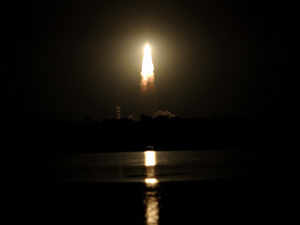Instant rockets: How ISRO is developing a niche in the global space market
ET Online|
Nov 23, 2017, 01.18 PM IST

In 2014, The New York Times published a cartoon that showed an Indian villager with a cow knocking at the door of a room marked Elite Space Club. The cartoon mocked India putting its Mangalyaan robotic probe into orbit around Mars. It portrayed India as an upstart.
Mangalayan mission cost India $74 million while the U.S. National Aeronautics and Space Administration’s Mars programme cost it $671 million. Prime Minister Narendra Modi had said India had spent less to reach Mars than Hollywood spent on a mere movie on space mission, Gravity, which cost $100 million.
Last year, India broke its own record by launching 20 satellites, including 17 from foreign countries, in one go. This year in February, India scripted history by successful launch of a record 104 satellites in a single mission.
India is now developing its low-cost edge.
Indian Space Research Organisation (Isro) is developing a small launch vehicle that can be assembled in just three days as compared to 30-40 days for a normal-sized PSLV and can be built at a cost which will be just one-tenth the original manufacturing cost of a PSLV. The manufacturing cost of a launch vehicle is generally in the range of Rs 150 crore to Rs 500 crore across the world.
Cost-competitiveness is India's big edge in the global space market. But India may soon lose that edge as American companies, especially SapceX of Elon musk, are developing reusable launch technology which will lower launch costs. ISRO's own reusable rocket project, named Avatar, is expected to take another nine years to complete. By then, SpaceX might have established its technology in the global launch market.
But ISRO's instant rocket could be an innovative way to cut costs.
Mangalayan mission cost India $74 million while the U.S. National Aeronautics and Space Administration’s Mars programme cost it $671 million. Prime Minister Narendra Modi had said India had spent less to reach Mars than Hollywood spent on a mere movie on space mission, Gravity, which cost $100 million.
Last year, India broke its own record by launching 20 satellites, including 17 from foreign countries, in one go. This year in February, India scripted history by successful launch of a record 104 satellites in a single mission.
India is now developing its low-cost edge.
Indian Space Research Organisation (Isro) is developing a small launch vehicle that can be assembled in just three days as compared to 30-40 days for a normal-sized PSLV and can be built at a cost which will be just one-tenth the original manufacturing cost of a PSLV. The manufacturing cost of a launch vehicle is generally in the range of Rs 150 crore to Rs 500 crore across the world.
Cost-competitiveness is India's big edge in the global space market. But India may soon lose that edge as American companies, especially SapceX of Elon musk, are developing reusable launch technology which will lower launch costs. ISRO's own reusable rocket project, named Avatar, is expected to take another nine years to complete. By then, SpaceX might have established its technology in the global launch market.
But ISRO's instant rocket could be an innovative way to cut costs.
